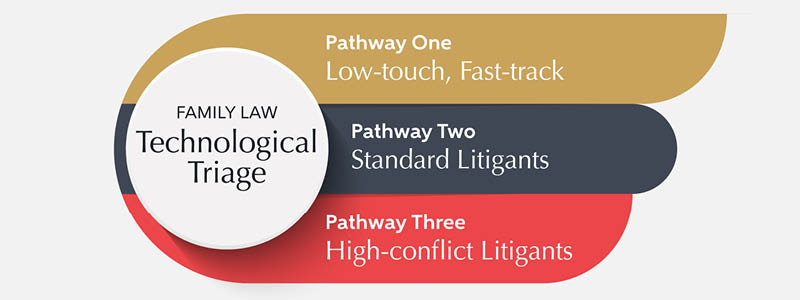Few areas of the law impact every facet of society as profoundly as family law, and perhaps no other practice area depends more on adaptability.
Indeed, family law plays a critical role in not only addressing our legal rights and obligations in a familial context by providing a legal framework to help resolve ongoing disputes and protect vulnerable parties, but also in shaping society and shoring up the very foundations of civilization.
That means evolving with the times, the changing family dynamics, and emerging trends like technology, mental health awareness and alternative dispute resolution.
There is no traditional mold for what makes a family and who comprises it.
From blended families and single-parent households to same-sex partnerships and adoptive families, family law's primary responsibility is to recognize this diversity and accommodate all families. It offers legal tools to ensure fairness and equity and keeps everyone's best interests at the forefront of the conversation.
By navigating complex issues, family law contributes to the ongoing discourse on the nature of familial bonds, ensuring that legal frameworks adapt to contemporary realities while providing a balanced and objective perspective.
As we look ahead, experts say these transformative trends will redefine family law, providing a comprehensive framework for practitioners to navigate the constantly changing environment.
The State of Family Law Today
At its core, family law is just one vital part of a greater legal system.
Through litigation and long-established legal frameworks, family law aims to foster stability and security within many types of familial relationships, balancing the interests of individuals with the collective well-being of families.
Whether navigating the complexities of marriage and divorce, pursuing adoption, or addressing child custody and financial support, family law plays a crucial role in shaping and representing the lives of individuals and families across the nation and the world over.
Marriage and Divorce
Marriage and divorce are two primary aspects of family law that make up a significant portion of legal cases in the practice area.
As a legal institution, marriage is not only an emotionally driven exchange but also includes a litany of legal responsibilities and rights.
Depending on the marriage, family law offers provisionary guidelines on property division, spousal support, prenuptial and postnuptial agreements and many other financial-based matters that come into play should a relationship dissolve to the point of divorce.
Divorce, perhaps an even more emotionally charged and stressful experience, can be a challenging legal process for everyone involved, making the safety and welfare of any children involved the top priority. This is where the child custody sector of family law comes into play.
Child Custody
Child custody and support arrangements, which can include co-parenting agreements or monetary support from either party, are vital components of the family law practice area.
The primary goal is to safeguard a child's well-being while fostering meaningful relationships with both parents whenever possible. Experienced family law attorneys are responsible for identifying when this can’t be achieved, and selecting the approach that best serves the client's interests.
Family law also handles issues such as domestic violence and subsequent child protection orders, providing individuals with legal resources, remedies and protective measures for those in vulnerable situations.
Though they may vary depending on state or local jurisdiction, these provisions help safeguard individuals from harmful experiences and aim to create safe, healthy environments for families to thrive.
The Rising Tide
The advent of the digital age has profoundly transformed how lawyers and families address parenting time disputes in family law.
Parenting time disputes can arise when one parent feels the other parent has violated an informal or formal parenting plan, leading to mediation, court motions or alternative dispute resolution.
Similar to other facets of family law, parenting time disputes ultimately come down to efficiency, equity and fairness between both parties. All too often, these high-conflict disputes are prompted by instances of substance or domestic abuse, which have a profound impact on the mental or physical well-being of any children involved.
Through the integration of technology, family law professionals aim to provide the best possible outcomes for their clients.
This technology integration comes through apps and, recently, artificial intelligence (AI), which has modernized specific lengthy legal processes like document review, drafting and case management, making them more efficient and streamlined.
Additionally, with the help of parenting apps, substance monitoring systems, e-filing platforms and virtual court appearances, family law professionals and the individuals they represent have more accessibility to structured change than ever before.
Technological Triage
Judge Keven M.P O’Grady of the Kansas 10th Judicial District’s court was plagued by capacity issues, mounting case-loads and overall public frustration with the legal process.
The solution to these complex problems is increasingly found in technology aids, the former family law lawyer told the 2024 American Association of Law Libraries conference in July.
Judge O’Grady partnered with University of Colorado School of Law professor Staci J. Pratt and the National Center for State Courts to develop a technological “triage” system to determine each case’s level of urgency.
Similar to medical triage, which sets an order of priority for incoming patients, this system uses an online data repository to categorize cases into three distinct categories: Pathway 1 (low-touch, fast-track), Pathway 2 (standard litigants) and Pathway 3 (high-conflict litigants).

The end product was a streamlined journey that seamlessly combined technology and process to simplify the family law experience for litigants.
Through apps, online documentation, virtual court appearances, the involvement of AI and new tech-based protocols such as the triage system show drastic improvements can be made to effectively meet each family's legal needs.
Though some of these technological solutions have become the gold standard in recent years, these tools are not expected to replace human reason and decision-making any time soon.
Putting Mental Health First
Treating them similar to any chronic illness, mental health issues, if left untreated, can affect many areas of an individual’s life, including family, familial relationships and parenting abilities.
Mental health, just like instances of substance abuse, dependency and domestic violence, can hold a significant weight over many litigated topics in the family law practice area, most notably in child custody cases.
Mental illness can prevent individuals from adequately caring for themselves, which can also influence their ability to care for a child and their well-being.
Without seeking professional treatment or help, any mental health issue can be a severe cause for concern from a legal standpoint. These mental ailments can include anything from depression and bipolar disorder to schizophrenia and borderline personality disorders.
In court proceedings where mental health is the primary concern, individuals may have to demonstrate they are properly addressing any issues.
In some cases, severe mental health conditions can affect an individual’s level of competency in court proceedings, leading them to not participate in hearings. The court would appoint a legal guardian or ad litem guardian to assist and represent a specific party in a court case.
Shedding the Stigma
Family law is increasingly prioritizing and addressing mental health concerns.
Recently, with a more accepting and stigma-free legal system, court hearings have been known to be put on hold for extended periods to allow individuals to receive necessary treatment.
Once mental competency is regained, no laws or limitations bar parents from participating in court proceedings.
Having a mental illness or diagnosis doesn’t automatically mean an individual is incapable of being a parent and forming a healthy relationship with their child.
The future of family law makes it easier for those facing mental health struggles to access the tools necessary to address ongoing issues and come to beneficial solutions.
Vicarious Trauma
While familial tensions and combative court proceedings can be traumatic experiences for anyone involved, those advocating on behalf of families or, in some cases, victims are sometimes overlooked.
Whether working with victims of domestic violence, substance abuse or highly contentious divorces, lawyers remain uniquely susceptible to vicarious trauma, even more so than many mental health professionals, according to a 2021 research study conducted by legal lecturers Kelley Burton and Amanda Paton.
The phenomenon, which has only recently gained coverage in the legal community, describes the psychological and emotional impact someone may experience because of their closeness to traumatic events and details.

Some key indicators that a lawyer may be experiencing this include emotional exhaustion, detachment, an influx in intrusive thoughts or could manifest in physical symptoms like chronic fatigue and headaches.
Being able to recognize and attend to vicarious trauma in lawyers is vital to ensuring the legal community feels supported and that their overall well-being, professional competency and ability to effectively represent their clients remains sound.
Embracing Alternative Dispute Resolution
Alternative dispute resolution in family law such as mediation and collaborative law is gaining so much popularity it isn’t exactly as “alternative” as it used to be.
Historically, alternative dispute resolution has been heavily utilized in labor negotiations and other contract disputes but has recently seen an uptick in the family law legal space, primarily in domestic family disagreements.
No matter the legal issue, a common notion is shared throughout the wide range of alternative dispute resolution applications: regardless of the case’s scale or level of controversy, the dispute resolution process always remains the same.
By emphasizing cooperation and open communication, the traditional “us versus them” adversarial nature of litigation can be avoided. In a family law mediation, a neutral third party would be appointed to assist the disputing parties in reaching a mutual agreement.
Conversely, in a collaborative law setting, parties and their appointed representatives would work together to resolve issues outside of court.
According to a 2020 national survey, conducted by LSU Law on behalf of the ABA Commission on the American Jury, both civil litigators and jurists alike ranked arbitration dead last in terms of fairness and personal preference for go-to alternative dispute resolutions.
In the same survey, similar groups ranked traditional jury trials as “the least predictable, slowest and least cost-effective” resolution method, leaning on mediation as the most preferred form of alternative dispute resolution among judges and attorneys.
Alternative dispute resolutions present many benefits that traditional litigation lacks.
Lower legal fees, faster resolution times and amicable court-based solutions that can preserve familial relationships in the long run account for alternative dispute resolution's growing popularity in family law cases.
The Future Impact
A constantly changing, complex practice area that demands as much adaptability as empathy, family law plays an important role in not just the legal system, but society as a whole.
By addressing essential issues like marriage, divorce and child custody, as well as highlighting mental health concerns, family law provides valuable legal resources to individuals in need, ensuring the protection, fairness and well-being of all affected parties.
As trends like technological and AI integration impact the future of family law, the practice area is poised for significant transformation. The use of artificial intelligence is streamlining processes, making legal services more efficient and precise.
Meanwhile, there is also a growing awareness of mental health in family law, influencing how cases are approached, and ensuring that emotional well-being is prioritized alongside legal considerations.
And a notable shift toward alternative dispute resolution methods could influence family law in even more surprising ways.
Mediation and arbitration, which offer more collaborative and less adversarial solutions than traditional litigation, are often faster and less costly, providing families with more accessible options for resolving their disputes.
Collectively, these advancements promise to deliver more efficient, effective and accessible solutions, ultimately aiming to uphold the stability and integrity of families requiring legal representation.































